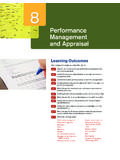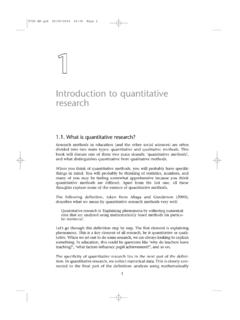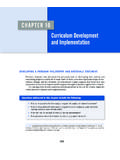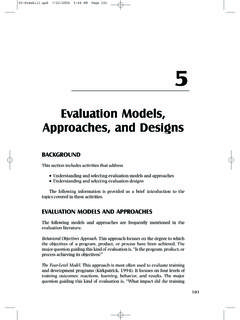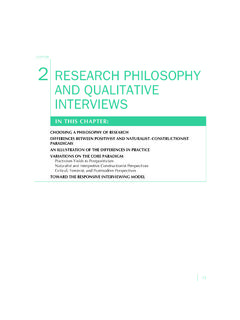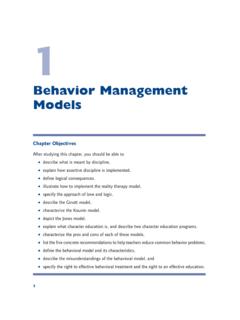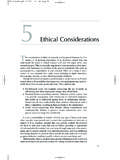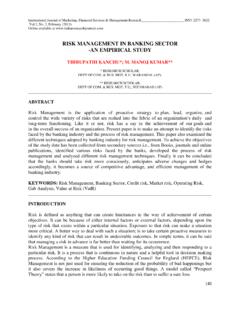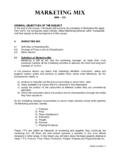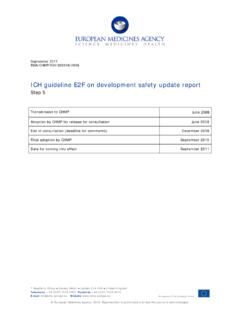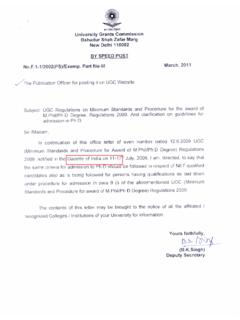Transcription of Ethical Considerations - SAGE Publications Inc
1 6/2/04 4:41 PM Page 53. 5 Ethical Considerations T he consideration of ethics in research, and in general business for that matter, is of growing importance. It is, therefore, critical that you understand the basics of Ethical research and how this might affect your research project. This is especially important if your research involves inter- action with businesses or members of the general community who serve as participants ( , respondents) in your research. There are a range of inter- actions in your research that might occur, including in-depth interviews, focus groups, surveys, or even observing people's behavior.
2 Though all researchers (student, professional, or academic) are well inten- tioned, there is the possibility that interaction with participants may inadver- tently harm them in some unintended way. This could include Psychological harm for example, researching the use of nudity in advertising may show participants images that offend them. Financial harm researching unethical behavior within a given firm may provide management with information on individual employees that results in an individual getting fired, or undertaking industry- based research may inadvertently share sensitive information with a firm's competitors, resulting in financial harm to the organization.
3 Social harm researching how lifestyle affects consumption may unintentionally disclose a person's sexual orientation when that person wanted to keep this confidential. It is your responsibility to consider whether any type of harm could occur when you plan your research and to ensure that mechanisms are instituted to remove it. It is, therefore, essential that you carefully evaluate the potential for harm to arise and ensure that you (a) behave according to appropriate Ethical standards; (b) consider how your research might negatively affect partici- pants; and (c) protect yourself, your supervisors/teachers, and your institution from being placed in situations in which individuals could make claims of inap- propriate behavior, resulting in public criticism or even your being sued.
4 Unfortunately, there is an increasing amount of litigation in the world and many universities have processes in place for vetting research to ensure that it is 53. 6/2/04 4:41 PM Page 54. 54 THE FOUNDATIONS. undertaken in an Ethical fashion. This ensures that the participant is protected and also ensures that the students, staff, and university undertaking the research are protected. In covering the topic of ethics, we are not trying to change your values, but rather we want to make you more aware of potential Ethical issues that might arise when undertaking your research.
5 To do this, some questions will be asked that, if appropriately answered, will ensure that potential Ethical problems are avoided. This chapter is designed to discuss a range of Ethical issues. Many of these issues are broadly covered in the various business and marketing ethics texts (for example, Smith & Quelch, 1992) as well as marketing research texts (for example, Churchill, 1991). These texts tend to look at research ethics from a client-agency perspective; that is, where the researcher is working for a client.
6 The following material will try to broaden this view by also consid- ering general social research ethics (Homan, 1991), covering a range of data collection approaches such as participant observation (Bulmer, 1982) and surveys/experiments (Sieber, 1982). What Is Human Intervention? _____. In the context of this chapter, human intervention is defined to encompass a broad range of activities, including interviews, review of corporate records, focus groups, experiments, oral histories, or surveys. It basically involves the researcher having access to information that is not in the public domain.
7 If your research involves accessing information that is readily and publicly available, such as a content analysis, meta-analysis, or literature review, it is unlikely that much of the material discussed within this chapter would apply, although some issues, such as academic fraud and plagiarism, would apply to all types of research. Some examples of student research that would be less likely to involve human intervention would include the following: Content analysis of information contained in advertisements A multiple-regression study that uses data from publicly available databases, such as Predicast An examination of a data set that was collected for another purpose, assuming that the participants had already given their prior permission for others researchers to access this data Codes of Ethical Conduct/Practice _____.
8 There are various Ethical codes of conduct that regulate researchers' behavior. These codes discuss many issues that potentially might arise in your research, as well as other issues associated with professional practice (Beauchamp &. Bowie, 1997). For example, the American marketing Association's code of conduct (AMA, 2003) touches on research-related issues and specifically states 6/2/04 4:41 PM Page 55. Ethical Considerations 55. that members must not knowingly do harm. It also specifies other issues of particular interest to professional marketers, such as the issues relating to the development of safe new products or the prohibition of price-fixing activities, and so forth (see Appendix ).
9 Ethical issues are also examined by the European Society for Opinion and marketing Research's (ESOMR, 2003) Code of Practice, which sets out researchers' broad responsibilities (see Appendix ). ESOMR provi- des more detailed codes and guidelines for a range of different activities, rang- ing from broad-based activities such as a Guide to Opinion Polls to more specific guidelines on Mystery Shopping and Interviewing Children (see Exhibit ). The codes are, of course, not static, and there are also specific detailed discussions of Ethical practice relating to new technologies such as the Internet (AMA, 2003; ESOMR, 2003).
10 Exhibit Index of ESOMAR Codes and Guidelines All ESOMAR members and the management of the marketing research companies listed in the ESOMAR Directory have undertaken to comply with the ICC/ESOMAR international Code of marketing and Social Research Practice which is applied by over 100 associations world-wide. 1. ICC/ESOMAR international Code of marketing and Social Research Practice ESOMAR Notes to interpreting the ICC/ESOMAR Code Annexe to the Code Notes regarding European Union Data Protection requirements 2.
